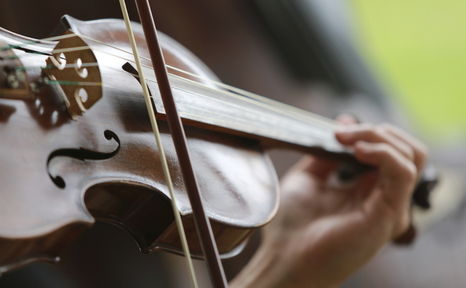

Having arthritis doesn't necessarily mean musicians have to stop playing.

Being a touring musician is a hard job. Life on the road away from family and friends for months at a time can take a toll, and it can be even tougher if you have arthritis. Day after day of overusing the same joints while practicing and performing can cause pain and soreness which affects many players, both professional and amateur. In fact, some authorities say that being a working musician is one of the worst careers for people with joint pain. But many musicians are finding ways to manage the pain and keep playing. They insist that an arthritis diagnosis doesn't have to mean the end of their passion for music.
Arthritic pain may lead some veteran musicians to put down their instruments. After 40 years of playing guitar for the rock band Rush, Alex Lifeson says the arthritis in his hands and feet that was diagnosed 10 years ago is becoming too much. The pain could keep him from playing in the future, leading fans to speculate that the 2015 tour might be Rush's last one.
"If I was going out on stage and I couldn't play the way I want to, or the way I've played in the past, there's no way I'd want to do it, " Lifeson told TeamRock.com. "I wouldn't want to go out there and be a shadow of my former self."
Sometimes, musicians blame their joint pain on moving heavy instruments, speakers, amplifiers, and other musical equipment. That's what world-touring violinist Fenella Barton assumed when she started feeling aches in her arms, knees, and feet, so she put off a visit to her doctor. According to Barton, that decision was a poor one—she was eventually diagnosed with rheumatoid arthritis. Barton now urges anyone with aches and pains or other arthritic symptoms to get checked without delay.
"Musicians often have loose joints, which allows them to do what they do, just like dancers and gymnasts," Dr. Erik Gall, professor of clinical medicine in rheumatology and interim director of the Arizona Arthritis Center in Tucson, told Everyday Health. "However, they are also at increased risk for injuring those joints."
Once diagnosed, Barton was able to continue playing after her doctor placed her on methotrexate for a few months. Prescribed for severe psoriasis and certain cancers, the drug can also help those with severe rheumatoid arthritis by lessening the body's immune system activity.
While there's no cure for most types of arthritis, early diagnosis and treatment can help players before the pain becomes too much. Continuing to play an instrument may also help fingers stay nimble and muscles strong. Many musicians living with arthritis say to never give up. They recommend spending more time stretching before practice, while cutting back on the actual hours spent playing.
Does Music Soothe Arthritis Pain?
Hand Exercises for Musicians with Arthritis
Mindfulness Moment: Using Music to Relax
Copyright © www.orthopaedics.win Bone Health All Rights Reserved